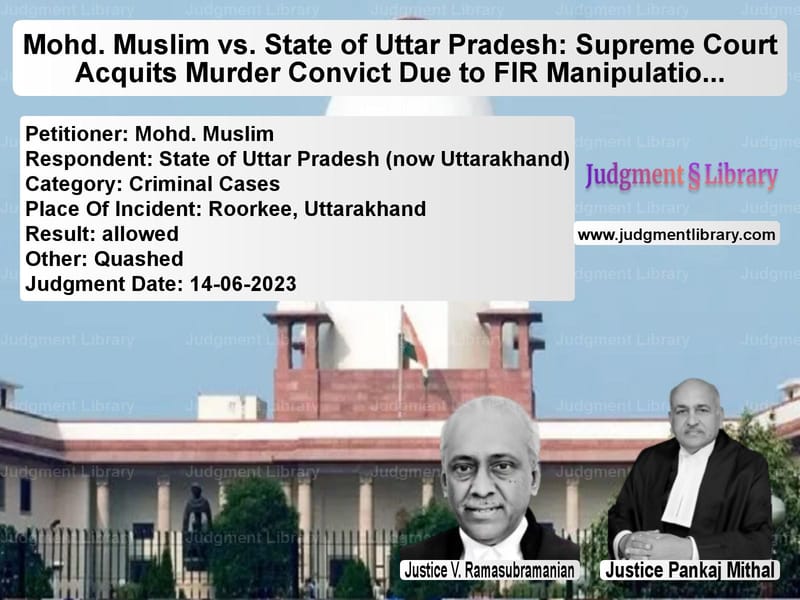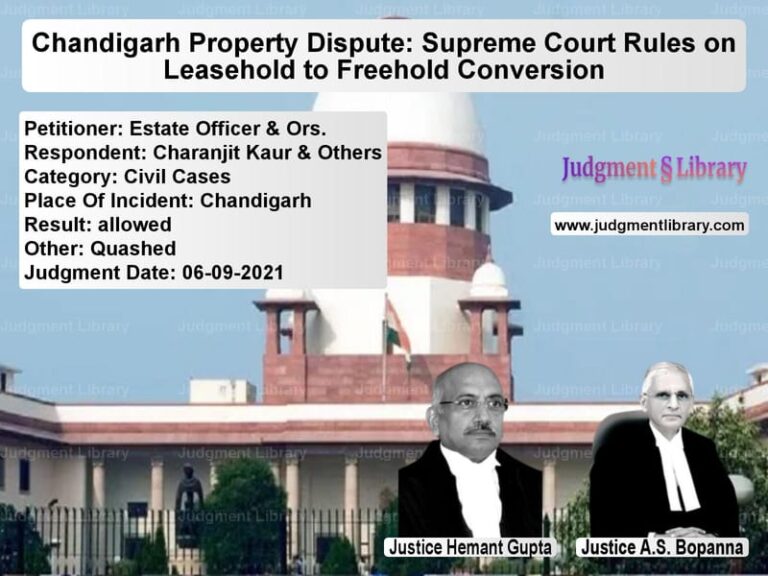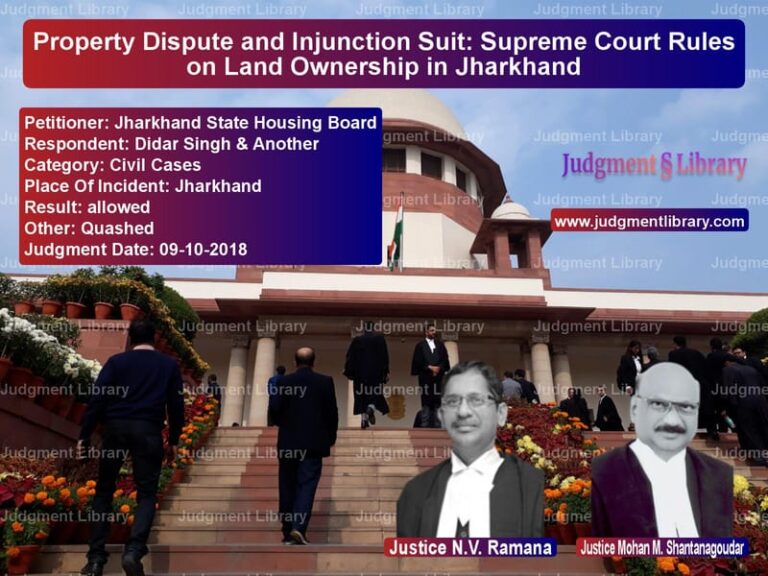Mohd. Muslim vs. State of Uttar Pradesh: Supreme Court Acquits Murder Convict Due to FIR Manipulation
The case of Mohd. Muslim vs. State of Uttar Pradesh (now Uttarakhand) revolves around a murder conviction under Section 302 of the Indian Penal Code (IPC). The Supreme Court, in its judgment dated June 15, 2023, set aside the conviction and granted acquittal, primarily due to FIR manipulation, lack of credible evidence, and inconsistencies in witness testimonies. The judgment underscores the importance of maintaining the integrity of police investigations and the legal process.
The case originated from an alleged murder incident on August 4, 1995, where the appellant, Mohd. Muslim, and his father were accused of killing Altaf Hussain over a land dispute. The prosecution relied on eyewitness accounts from the deceased’s son and nephew. However, the Supreme Court found serious flaws in the evidence presented by the prosecution.
Background of the Case
The prosecution’s case was based on the following allegations:
- The accused, armed with a tabal (chopper) and an axe, attacked the deceased, Altaf Hussain, while he was on his way to Roorkee for a court hearing regarding a land dispute.
- The attack occurred around 9:00 AM near the Bajari Plant on G.T. Road.
- The deceased’s son, Salim Ahmad (PW-1), and nephew, Irshad (PW-2), were following him on bicycles and witnessed the crime.
- Two independent witnesses, Tahir and Md. Afzal (PW-3), attempted to intervene but failed as the accused fled toward the jungle, leaving behind a cycle and a loi (blanket).
- The police arrested the accused on August 7, 1995 and recovered the alleged murder weapons based on their confessions.
- The trial court convicted both accused and sentenced them to life imprisonment, which was upheld by the Uttarakhand High Court in 2010.
Key Legal Issues Considered
- Whether the FIR was manipulated to fabricate evidence against the accused.
- Whether the prosecution failed to establish the accused’s presence at the crime scene.
- Whether the alleged eyewitnesses’ behavior was unnatural and unreliable.
- Whether there was an unexplained delay in sending the FIR to the magistrate.
Supreme Court’s Analysis and Judgment
1. FIR Manipulation and Ante-Timing
The Supreme Court found that the prosecution had manipulated the timing of the FIR. The original FIR recorded the crime at 1:50 PM, but this was later altered to 9:00 AM to align with the prosecution’s narrative. The Court stated:
“A bare pursual of the FIR clearly shows that there is some interpolation in the time of its lodging mentioned therein. It is evident from the naked eye that ‘1’ has been converted into ‘9’, and ‘5’ has been rounded off to make ‘0’, whereas ‘PM’ has been converted into ‘AM’.”
This tampering cast doubt on the entire case, as the alleged murder was linked to a court hearing that occurred earlier in the day.
2. Delayed Transmission of FIR to the Magistrate
The FIR was allegedly filed at 9:00 AM on August 4, 1995, but it was only sent to the magistrate on August 8, 1995. The Court noted:
“The unexplained delay of four days in transmitting the FIR to the magistrate seriously affects its credibility.”
This delay suggested that the police had manipulated the FIR to match a fabricated sequence of events.
3. Lack of Corroboration from Independent Witnesses
The prosecution failed to examine Tahir, one of the alleged eyewitnesses. The Court emphasized that:
“Failure to examine an independent eyewitness raises serious doubts about the prosecution’s version.”
The other independent witness, Md. Afzal (PW-3), provided contradictory statements, making his testimony unreliable.
4. Unnatural Conduct of Eyewitnesses
The behavior of the deceased’s son (PW-1) and nephew (PW-2) raised doubts. The Court found it unnatural that:
- Neither attempted to save the deceased despite being close to the crime scene.
- They did not immediately seek medical help but instead prioritized lodging an FIR.
The judgment observed:
“If they had witnessed the crime, their first instinct should have been to save the deceased, not to rush to the police station.”
5. Failure to Prove Accused’s Presence at the Crime Scene
The prosecution claimed the accused fled, leaving behind a cycle and a loi (blanket). However, the Court noted:
“No effort was made to establish that the recovered items belonged to the accused.”
This weakened the claim that the accused were present at the crime scene.
6. Recovery of Weapons Based on Confession
The police recovered the alleged murder weapons based on the accused’s confessions. However, the Court ruled:
“A confession made to the police is inadmissible under Section 25 of the Evidence Act unless independently corroborated.”
Since no forensic evidence linked the weapons to the crime, their recovery was deemed unreliable.
Final Ruling
- The Supreme Court set aside the convictions of both accused.
- The accused were acquitted due to lack of credible evidence.
- The Court directed that the accused be released immediately if not required in any other case.
Implications of the Judgment
This ruling has critical implications for criminal law and fair trial principles:
- It reinforces that FIRs must be recorded accurately and without manipulation.
- It emphasizes the need for independent and corroborated evidence in murder trials.
- It highlights the importance of prompt FIR transmission to the magistrate.
- It serves as a reminder that confessions to police without independent proof are inadmissible.
Conclusion
The Supreme Court’s decision in Mohd. Muslim vs. State of Uttar Pradesh is a crucial ruling that safeguards the principles of fair trial and due process. By acquitting the accused, the Court has reiterated that convictions must be based on solid evidence rather than manipulated FIRs, unreliable witness statements, or unverified forensic findings. This case serves as an important precedent in ensuring that law enforcement agencies maintain transparency and integrity in criminal investigations.
Petitioner Name: Mohd. Muslim.Respondent Name: State of Uttar Pradesh (now Uttarakhand).Judgment By: Justice V. Ramasubramanian, Justice Pankaj Mithal.Place Of Incident: Roorkee, Uttarakhand.Judgment Date: 14-06-2023.
Don’t miss out on the full details! Download the complete judgment in PDF format below and gain valuable insights instantly!
Download Judgment: mohd.-muslim-vs-state-of-uttar-prade-supreme-court-of-india-judgment-dated-14-06-2023.pdf
Directly Download Judgment: Directly download this Judgment
See all petitions in Murder Cases
See all petitions in Bail and Anticipatory Bail
See all petitions in Judgment by V. Ramasubramanian
See all petitions in Judgment by Pankaj Mithal
See all petitions in allowed
See all petitions in Quashed
See all petitions in supreme court of India judgments June 2023
See all petitions in 2023 judgments
See all posts in Criminal Cases Category
See all allowed petitions in Criminal Cases Category
See all Dismissed petitions in Criminal Cases Category
See all partially allowed petitions in Criminal Cases Category







